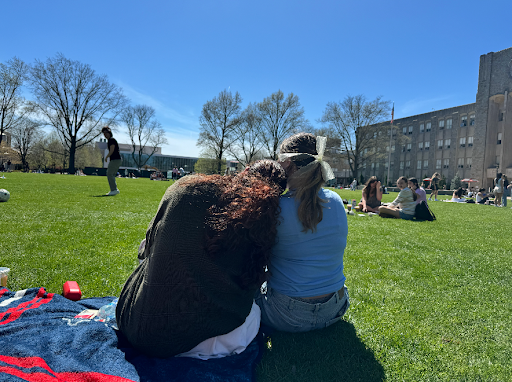Picture this: You wake up on a beautiful Saturday morning. The weather and temperature are much to your liking, and there are no classes or work for the next two days. As you get out of bed and begin to go about the rest of your day, you feel a sinking sensation in your stomach as you start to think about the coming Monday. There is a marketing test that morning that you are positive you will fail, followed by an afternoon at work where you are not getting along with your supervisor. What if you fail the entire class? What if your supervisor is planning a way to get you fired? How will you make it through the day without a breakdown? There will be no enjoying this weekend at all; Monday is just too big of a problem.
To some, this example may sound a little extreme and melodramatic, but if any of you ever do feel like this, you are not alone. The National Institute of Mental Health (NIMH) reports that anxiety disorders affect about forty million Americans ages 18 and older in a given year. The NIMH Web Site explains that anxiety is a normal reaction to help a person deal with stressors, such as those presented in the example above. But when it turns into an excessive, irrational dread of everyday situations, it has become a disabling disorder.
The hypothetical situation above is a prime example of generalized anxiety disorder, or GAD. According to WebMD, this particular anxiety disorder affects about four million American adults, and is characterized by anxiety that is unrealistic or out of proportion for an everyday situation.
Symptoms include, but are not limited to, excessive and ongoing worry and tension, an unrealistic view of problems, restlessness, irritability, trouble falling asleep and difficulty concentrating. The anxiety can become so bad that it impedes a person’s ability to function.
Furthermore, people with GAD are more prone to depression and other anxiety disorders, including social anxiety disorder, which is characterized by irrational anxiety with regard to social situations.
“I’ve had friends that feel anxiety to this extent, and have always encouraged them to look for a course of treatment,” said Junior Stephanie Adler. “Mental well-being is just as important as physical fitness when it comes to staying healthy.”
Fortunately, there is a way out of the vicious cycle of anxiety. As with anything, the first step toward solving a problem is admitting you have one. This is very important as it will help you become more pro-active in finding a solution. If you are not sure, take the National Anxiety Screening Test. The Counseling Center will be offering screenings at the UC Commons on March 11, Marillac Cafeteria on March 12 and Montgoris on March 13, from 11:30a.m. to 1p.m. The screening is also available through the St. John’s University website.
Next, speak to somebody about your uneasiness. The Counseling Center in Marillac 130 is open five days a week for short-term counseling and offers referrals to students who are experiencing long-term difficulties. Psychotherapy is a very common and effective treatment for those who suffer from severe anxiety.
There are also several self-help techniques that can help to alleviate those worrisome feelings. Switching to a healthier diet has always been a popular suggestion.
Exercise will not only make you feel better physically; it can promote a more relaxed mindset. Meditation and yoga are other relaxation techniques that can allow your mind to relax and release pressure. Or try one of your favorite activities.
“Playing guitar has always helped me,” said freshman Frank Emanuele. “Even if I don’t completely forget about what was bothering me, I feel more refreshed and able to face it again.”
If these self-help methods do not seem to make the anxiety subside, and if you do not feel any difference after a few counseling sessions, then it may be time to consider medication. While there are several different types of medications used to treat anxiety disorders, this option should be thoroughly explored with a doctor before beginning a prescription.
Anxiety and stress are far from uncommon for college students. Some might even agree that they come with the territory. At times, stress can even be a motivating and therefore helpful thing, but nobody should have to suffer when the anxiety becomes debilitating. Remember that there is absolutely nothing wrong with having a problem like this. What is not okay is allowing the problem to continue and overwhelm your life, because the only person that is going to suffer is you. And perhaps your friends. There is no reason for it, as life is meant to be enjoyed.

















